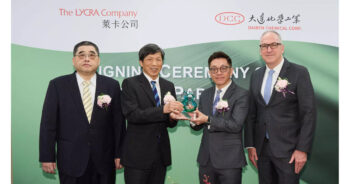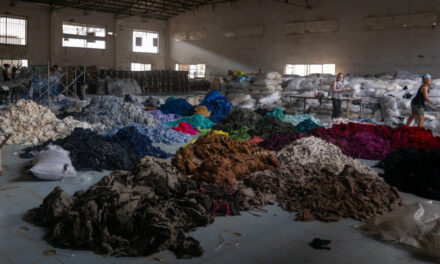 The LYCRA Company, a global leader in developing innovative, sustainable solutions for the apparel and personal care industries, announced today that it has signed a letter of intent with Dairen Chemical Corporation (DCC) to convert QIRA®—the next generation 1,4-butanediol (BDO)—into low-impact PTMEG, the main ingredient in patented bio-derived LYCRA® fiber. Dairen will be the first company in the world to mass produce this low-impact bio-PTMEG at scale.
The LYCRA Company, a global leader in developing innovative, sustainable solutions for the apparel and personal care industries, announced today that it has signed a letter of intent with Dairen Chemical Corporation (DCC) to convert QIRA®—the next generation 1,4-butanediol (BDO)—into low-impact PTMEG, the main ingredient in patented bio-derived LYCRA® fiber. Dairen will be the first company in the world to mass produce this low-impact bio-PTMEG at scale.
In September 2022, The LYCRA Company and Qore® announced they were joining forces to enable the production of bio-derived LYCRA® fiber made with QIRA®. Now, DCC joins this distinctive collaboration, converting QIRA® into bio-PTMEG. This unique PTMEG will make up the renewable portion of LYCRA® fiber, accounting for 70% of the fiber’s content. It is being made exclusively for The LYCRA Company to its stringent specifications. With its low-impact allyl alcohol process, DCC has pioneered a technology that creates the lowest-impact PTMEG available, which is cleaner and has a lower carbon footprint than product produced with natural gas or coal.1
The LYCRA Company, Qore®, and DCC are united by a shared commitment to R&D, health and safety, sustainability, and conservation. To mark this event, Steve Stewart, The LYCRA Company’s chief brand and innovation officer, presented DCC with a Green Partner Award. The award acknowledges DCC’s ongoing sustainability efforts and commitment to creating low-impact products.
 “Our collaboration heralds a brand-new era of environmentally conscious production activities, fueled by our shared commitment to reducing carbon footprints and developing world-leading eco-friendly solutions,” said DCC’s chairman, Lin Shean-Tung. “Sustainability is not merely a trend, but an imperative for the future of our planet. We are honored to receive the Green Partner Award and embark on this journey alongside The LYCRA Company, advancing sustainable practices in the industry.”
“Our collaboration heralds a brand-new era of environmentally conscious production activities, fueled by our shared commitment to reducing carbon footprints and developing world-leading eco-friendly solutions,” said DCC’s chairman, Lin Shean-Tung. “Sustainability is not merely a trend, but an imperative for the future of our planet. We are honored to receive the Green Partner Award and embark on this journey alongside The LYCRA Company, advancing sustainable practices in the industry.”
Available in early 2025, patented bio-derived LYCRA® fiber made with QIRA® will be the world’s first renewable spandex available on a large scale. By using annually renewable dent corn, an initial screening calculation indicates that the carbon footprint of LYCRA® fiber potentially could be reduced by up to 44 percent2 compared to LYCRA® fiber without bio-derived materials. Further, the fiber will offer equivalent performance to traditional LYCRA® fiber, making it an easy replacement for mills, brands and retailers.
“We are excited to collaborate with DCC to bring bio-derived LYCRA® fiber made with QIRA® to market and realize our shared vision for a more sustainable value chain,” said Stewart. “Given the combination of using bio-derived input from corn, plus conversion at a state-of-the-art QORE® facility run on wind power, and transformation to PTMEG using DCC’s low-impact process, we anticipate the potential for additional reductions as we go into production.”
For many years, Dairen has demonstrated its sustainability efforts in raw materials management, waste elimination, process enhancement, innovations, and more. It has also achieved significantly lower carbon emissions in its product offerings than its competition.
“Sustainability has evolved from fulfilling requirements to being a competitive advantage,” said Simon Chuang, vice president of global sourcing and procurement at The LYCRA Company. “We’re committed to selecting, promoting, and expanding our business with supply partners like DCC who embrace and drive meaningful sustainability efforts.”






















